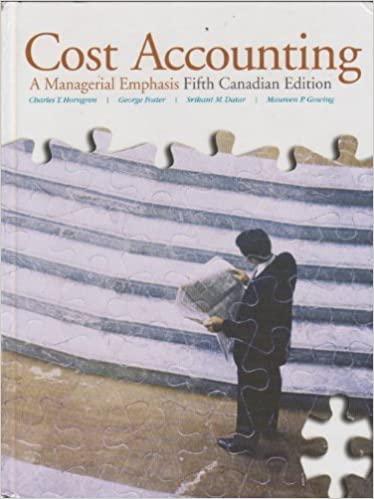Goal-congruence, taxes, different market conditions. TECA Halifax makes kids bicycles. 1. Contribution margin The Frames Division makes
Question:
Goal-congruence, taxes, different market conditions. TECA Halifax makes kids’ bicycles.
1. Contribution margin The Frames Division makes and paints the frames and supplies them to the Assembly Division from new frame, $272 where the bicycles are assembled. TECA is a successful and profitable corporation that attributes much of its success to its decentralized operating style. Each division manager is compensated on the basis of division operating income.
The Assembly Division currently acquires all its frames from the Frames Division. The Assembly Division manager could purchase similar frames in the market for $480.
The Frames Division is currently operating at 80% of its capacity of 4,000 frames
(units) and has the following particulars:
All the Frames Division’s 3,200 units are currently transferred to the Assembly Division.
No frames are sold in the outside market.
The Frames Division has just received an order for 2 ,000 units at $450 per frame that would utilize half the capacity of the plant. The order has to be either taken in full or rejected totally. The order is for a slightly different frame than what the Frames Division currently makes but takes the same amount of manufacturing time. To produce the new frame would require direct materials per unit of $100, direct manufacturing labour per unit of $48, and variable manufacturing overhead costs per unit of $30.
INSTRUCTIONS Form groups of two or three students to complete the following requirements.
REQUIRED 1. From the viewpoint of TECA Halifax as a whole, should the Frames Division order for the accept the 2,000 units?
2. What range of transfer prices result in achieving the actions determined to be optimal in requirement 1, if division managers act in a decentralized manner? \ 3. The manager of the Assembly Division has proposed a transfer price for the frames equal to the full cost of the frames including an allocation of overhead costs. The Frames Division allocates overhead costs to engines on the basis of the total capacity of the plant used to manufacture the frames.
a. Calculate the transfer price for the frames transferred to the Assembly Division under this arrangement.
b. Do you think that the transfer price calculated in requirement 3
(a) will result in achieving the actions determined to be optimal in requirement 1, if division managers act in a decentralized manner?
c. Comment in general on one advantage and one disadvantage of using full costs of the 1134 | chapter 23 . producing division as the basis for setting transfer prices.
4. Now consider the effect of income taxes.
a. Suppose the Assembly Division is located in a country that imposes a 10% tax on income earned within its boundaries, while the Frames Division is located in a country that imposes no tax on income earned within its boundaries. What transfer price would be chosen by TECA to minimize tax payments for the corporation as a whole? Assume that only transfer prices that are greater than or equal to full manufacturing costs and less than or equal to the market price of “substantially similar” engines are acceptable to the taxing authorities.
b. Suppose that TECA announces the transfer price computed in requirement 4
(a) to price all transfers between the Frames and Assembly Divisions. Each division manager then acts autonomously to maximize division operating income. Will division managers acting in a decentralized manner achieve the actions determined to be optimal in requirement 1?
5. Consider your responses to requirements | to 4 and assume the Frames Division will continue to have opportunities for outside business as described in requirement 1. What transfer pricing policy would you recommend TECA use and why? Would you continue to evaluate division performance on the basis of division operating incomes?LO1
Step by Step Answer:

Cost Accounting A Managerial Emphasis
ISBN: 9780135004937
5th Canadian Edition
Authors: Charles T. Horngren, Foster George, Srikand M. Datar, Maureen P. Gowing





